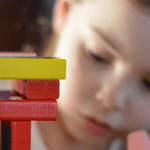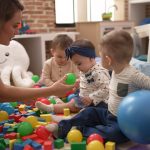As a childcare provider, what can you do to ensure your services are accessible when it comes to providing childcare for special needs children? From interactive learning to more flexible timetables, we cover the basics of offering childcare provision that is truly inclusive. Defined by the Department of Health as a “significantly reduced ability to understand new or complex information, to learn new skills, with a reduced ability to cope independently”, there are thousands of child in the UK with some form of diagnosed learning disability.
Like all children, they need to play and learn. For many parents of children with learning disabilities, the sad truth is that finding a childminder or day nursery with the staff and skills to look after their child is difficult.
Offering childcare for special needs children means adapting provision so that they are safe and nurtured, whilst being able to safely access play and learning activities.
Every child has a unique personality and special skills so how as a childcare provider can you provide the childcare for special needs children that so many parents are looking for?
Plan together
Every child has different needs and for a child with a learning disability, these needs can be complex and profound. This doesn’t mean that childcare provision is not to be found but it does mean making changes.
Adaptations can be anything from the amount of exercise they have to the kind of activities they want to do and more. For example, a more flexible timetable ensures learning stays on track but accommodates the challenges that some children with learning disabilities can face.
Plan the provision with the parents or caregivers and seek advice too from their social worker if they have one and other professional sources.
Small changes, big impact

For some children with a learning disability, a quiet and calm space is just as important as plenty of activity and friends.
Some childcare providers have professed to not being able to accommodate children with special needs or disabilities because the adaptations are too big, too expensive or too disruptive to make.
But research and real-life case studies have shown that small changes have a huge impact. Quiet space is ideal for any child but for a child with a learning disability, their need for calm space can be frequent.
Invest in accessible play equipment
Play equipment and toys should be accessible to every child that a nursery or childminder cares for. And yet, so many ‘mainstream’ toys are simply not accessible or suitable for a child with a disability.
Consider, for example;
- Improving lighting in playrooms so that a child with visual issues can see items better
- Use different colours to define different areas, using bright, happy colours in strong tones for playrooms and more muted colours in other areas to denote a change in use
- Consider the flooring too – is it non-slip? Are there obstacles to walking or using walking aids from one room to another? How does it really look to a child who is not as quick in processing visual information and clues
Inclusivity
Inclusivity is not just about ensuring that staff understand how to interact with children with disabilities – it is about the other children you care for at the same time too.
Having said that, children rarely see the differences as this trailer from the BBC’s Everyone Welcome campaign highlights. When asked what makes them different, none of the children pointed out that their friend was in a wheelchair or their friend has Down Syndrome or their friend was a different colour or gender to themselves.
But we need to make sure as adults, that we continue to model this behaviour and it starts with the language that we use to interact and encourage children to play and connect with each other.
Grow your own skillset for childcare for special needs children to accommodate their needs
However, we also need to recognise that for childcare staff, working with and caring for a child with learning disabilities can be daunting, more so when they feel unprepared for and unsupported.
Online childcare courses and childminding courses are available for specific topics, such as working with children with physical disabilities as well as learning disabilities, as well as topics such as Autism and ADHD.
The better trained a childcare worker is, the more prepared and skills they are for creating a safe and nurturing play environment that is truly inclusive and accessible for all children.
Charities and support groups also advocate that alongside being skilled and trained, childcare workers shouldn’t be frightened of asking questions or seeking feedback from parents, caregivers or the child, if this is appropriate.
Every child has the right to play, to be safe and to be nurtured and not excluded from activities because they have a disability, physical or otherwise. And childcare providers have a responsibility to offer a fantastic learning and play environment for every child.








